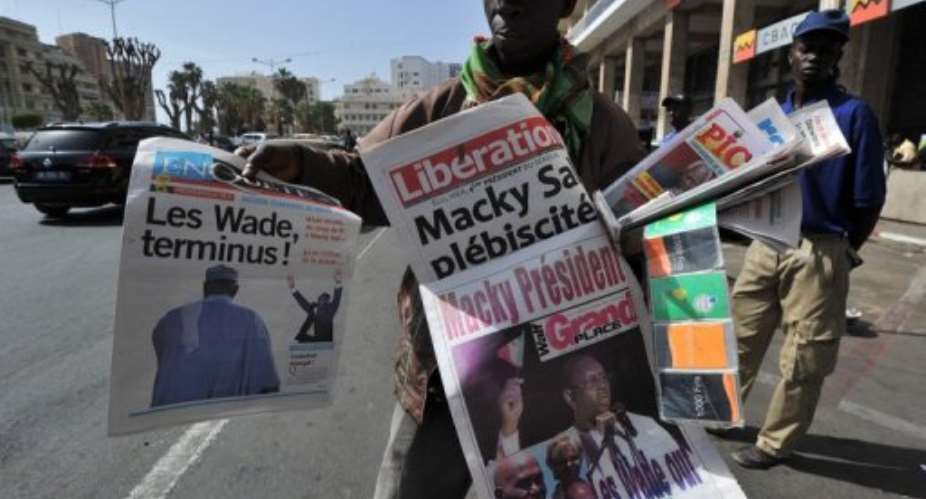JOHANNESBURG (AFP) - Senegal's peaceful handover of power from veteran ruler Abdoulaye Wade to his estranged protege Macky Sall is a boost for Africa where democratic transitions are rare, analysts say.
"Recently we have seen a lot of dissent against autocratic and authoritarian rule in Africa," said Malawi-based political analyst Ben Chiza Mkandawire.
"Therefore the election in Senegal will act as a point of reference for other pro-democratic agencies across the continent."
Like Wade, 85, Malawi's President Bingu wa Mutharika was elected to office.
And like Wade he has come under fierce criticism for an authoritarian turn that has provoked violent protests over the last year.
Events in Senegal will "actually send a chilling warning to other dictatorships in Africa, as it symbolises a change in how democracy is perceived by the electorate," Mkandawire said.
Wade, whose controversial bid for a third presidential term sparked deadly riots, conceded election defeat to Sall on Sunday, scotching fears that he would try to cling to power.
Shehu Dalhatu, director of Nigeria's Centre for Democratic Research and Training, said Senegal's election "makes all of us feel proud that the democratic culture is attainable in the continent.
"Although the government of President Wade tried unsuccessfully to manipulate the process, the pressure and persistence of the Senegalese people carried the day, and Wade bowed to it."
David Zounmenou, a researcher from Benin at the Institute for Security Studies in South Africa, also praised "Senegal's happy example, which will be useful when other standoffs happen on the continent".
But most analysts agreed on another point: Senegal isn't the norm in Africa.
"We cannot say yet that a new democratic momentum is underway in sub-Saharan Africa," Dalhatu said.
"The reason is that we still have sit-tight African leaders who do not want to cede power after staying in office for decades. Cameroon, Zimbabwe are some of the examples that readily come to mind."
Cameroon's President Paul Biya was sworn in last November for a sixth term after an election win mired in allegations of fraud.
Zimbabwe's Robert Mugabe, 88, has been in power since independence in 1980.
"Since the 1990s, Senegal has always been an exception," said Wilson Andre Ndombet, of Omar Bongo University in Libreville.
"What's happening now confirms that there is a history, a political culture in Senegal. It's a showcase for Africa."
Several factors set Senegal apart, he added: a high level of political activism among the population; the integrity of the electoral authorities; the neutrality of the army; and Wade's willingness to accept the result.
But that combination of factors does not exist everywhere in Africa.
The contrast is particularly sharp in neighbouring Mali, which suffered a coup last week after years of democratic rule -- and weeks away from elections that had been scheduled for April 29.
"Even within the West African context, Senegal is more the exception than the rule, so I don't see there's any regional pattern, or any emerging pattern," said Charles Onyango-Obbo, an editorial writer for Nation Media in Kenya.
Former West African powerhouse Ivory Coast, hailed as a beacon of stability for decades, suffered two coups and then a civil conflict after strongman Laurent Gbagbo refused to concede defeat in the first election held in a decade.
"From a historical point of view, Senegal seems to confirm that countries which do not have a violent past are more likely to transition towards mature democracy than the ones that do," he said.
Despite recent successes, such as last year's elections in Zambian and Ghana's in 2008, where the ruling party peacefully handed power to the opposition, those countries remain in the minority, said Onyango-Obbo.
"Then you have all the bad cases: the Angolas, Zimbabwes, Eritreas. But the balance is still leaning very much towards the bad guys column."





 Ejisu by-election: Aduomi warns NPP against voter intimidation
Ejisu by-election: Aduomi warns NPP against voter intimidation
 High Court orders implicated four NDA officials to present defence
High Court orders implicated four NDA officials to present defence
 Let’s all be matured, patriotic to have a peaceful election this year – Dampare ...
Let’s all be matured, patriotic to have a peaceful election this year – Dampare ...
 Mahama's administration saw thievery that knew no bounds; stole from market wome...
Mahama's administration saw thievery that knew no bounds; stole from market wome...
 GRA/SML deal: Always read the stories behind the headlines or you'd look stupid ...
GRA/SML deal: Always read the stories behind the headlines or you'd look stupid ...
 GRA/SML Contract: It takes some 'wild' boldness for a president to make this dec...
GRA/SML Contract: It takes some 'wild' boldness for a president to make this dec...
 Elisu By-election: "If you call yourself a man, boo Chairman Wontumi again" — Bo...
Elisu By-election: "If you call yourself a man, boo Chairman Wontumi again" — Bo...
 Fuel tanker driver escapes with his life after tanker goes up in flames near Suh...
Fuel tanker driver escapes with his life after tanker goes up in flames near Suh...
 Uniform change: ‘Blue and white are brighter colours’ — Kwasi Kwarteng explains ...
Uniform change: ‘Blue and white are brighter colours’ — Kwasi Kwarteng explains ...
 MoE not changing all public basic school uniforms but only newly built ones — Kw...
MoE not changing all public basic school uniforms but only newly built ones — Kw...
